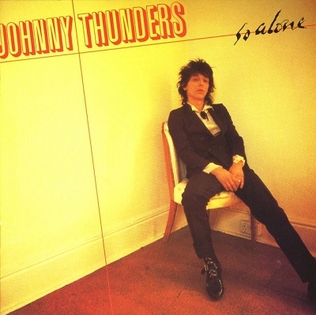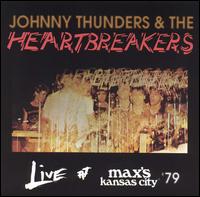
Richard Lester Meyers, better known by his stage name Richard Hell, is an American singer, songwriter, bass guitarist and writer.

Douglas Glenn Colvin, better known by his stage name Dee Dee Ramone, was an American musician. He was the bassist and a founding member of the punk rock band the Ramones. Throughout the band's existence, he was the most prolific lyricist and composer, writing many of their best-known songs, such as "53rd & 3rd", "Chinese Rock", "Commando", "Wart Hog", "Rockaway Beach", "Poison Heart" and "Bonzo Goes To Bitburg". The latter won the New York Music Award for best independent single of the year in 1986, while Animal Boy, which the song is from, won for best album.

End of the Century is the fifth studio album by the American punk rock band Ramones, released on February 4, 1980, through Sire Records. The album was the band's first to be produced by Phil Spector, though he had offered the band his assistance earlier in their career. With Spector fully producing the album, it was the first release that excluded original member Tommy Ramone, who had left the band in 1978 but had produced their previous album Road to Ruin. Spector used more advanced standards of engineering, such as high-quality overdubbing and echo chambers. These painstaking methods caused conflict between the band and Spector since the Ramones were accustomed to a quicker recording process. Spector emphasized the production value as well, working with a budget of around $200,000, far exceeding their earlier album sessions.

John Anthony Genzale, known professionally as Johnny Thunders, was an American guitarist, singer and songwriter. He came to prominence in the early 1970s as a member of New York Dolls. He later played with the Heartbreakers and as a solo artist.
"Chinese Rocks" or "Chinese Rock" is a song written in 1975 by New York punk rock musician Dee Dee Ramone with contributions from Richard Hell. Inspired by Lou Reed's "Heroin", the song openly details the day-to-day struggles of a heroin addict, and is based on Dee Dee's real-life experiences.
The Heartbreakers, sometimes referred to as Johnny Thunders and the Heartbreakers, were an American punk rock band formed in New York City in 1975. The band spearheaded the first wave of punk rock.

Leave Home is the second studio album by the American punk rock band Ramones. It was released on January 10, 1977, through Sire Records, with the expanded CD being released through Rhino Entertainment on June 19, 2001. Songs on the album were written immediately after the band's first album's writing process, which demonstrated the band's progression. The album had a higher production value than their debut Ramones and featured faster tempos. The front photo was taken by Moshe Brakha and the back cover, which would become the band's logo, was designed by Arturo Vega. The album spawned three singles, but only one succeeded in charting. It was also promoted with several tour dates in the United States and Europe.

Sid Sings is the first released solo live album by English punk rock musician Sid Vicious. It was released posthumously in 1979 and entered the British album charts on 15 December where it peaked at number 30.

Gerard Nolan was an American rock drummer, best known for his work with the New York Dolls and The Heartbreakers.

Subterranean Jungle is the seventh studio album by the American punk rock band Ramones, released by Sire Records on February 23, 1983. Overall, the album featured a return to a somewhat more hard punk rock style compared to the band's previous two albums End of the Century in 1980, and Pleasant Dreams in 1981, which were the most pop-focused of the band's career. This direction was encouraged by guitarist Johnny Ramone. The recording sessions saw disputes between band members, mainly due to struggles with alcohol addiction by Joey Ramone and Marky Ramone, and the drug addiction of Dee Dee Ramone.

Too Tough to Die is the eighth studio album by the American punk rock band Ramones. It was released on October 1, 1984, and is the first Ramones record to feature Richie Ramone on drums. With ex-member Tommy Ramone producing, the recording process was similar to that of the band's 1976 self-titled debut album. Likewise, the record's style—both lyrically and compositionally—saw the band returning to their roots. The photograph on the album cover, which features silhouettes of the band members, resulted from a "lucky accident" after photographer George DuBose's camera malfunctioned.

So Alone is the debut solo studio album by Johnny Thunders, then leader of the Heartbreakers and formerly lead guitarist for New York Dolls.

Too Much Junkie Business is a compilation of studio demos and live recordings, recorded in late 1982 by protopunk guitarist and singer Johnny Thunders. It is one of the original releases by Neil Cooper's then cassette-only label ROIR. It was reissued in 1999 on compact disc as The New Too Much Junkie Business.

Live at Max's Kansas City is a live album by The Heartbreakers. Recorded at a "reunion"/"farewell" show on September 16, 1978 at the famous Max's Kansas City nightclub, the album's performance — loud, sloppy, and laden with bawdy introductions and/or lyric changes to many of the familiar songs from their only studio album, L.A.M.F. — further cemented the band's live reputation. A classic of early punk rock, the album has been called "probably the best official document of any New York band of the era."
Danny Ray is an American tenor saxophonist. Known for his sax style which evolved from early punk rock and R&B roots he is a long-time contributing artist to the New York City music scene and has been identified with the moniker, "Exploding Sax".
Ramport Studios was a recording studio in south London's Battersea district, built by the Who in 1973.

Stations of the Cross is a Johnny Thunders album recorded over two sets at The Mudd Club in New York on September 30, 1982. Film director Lech Kowalski had originally planned to record a live Johnny Thunders performance for his movie, Stations of the Cross. The spoken dialogue was recorded at the Carlton Arms Hotel, New York City, in Room 29, on August 25, 1982.

The Idols with Sid Vicious is a concert album of former Sex Pistols bassist Sid Vicious performing with The Idols; though recorded in September 1978, it wasn't released until 1993. Steve Dior provided a recording of this performance to the New Rose record label. It was originally released by the Fan Club division of New Rose. It was also released in Japan by Teichiku Records, under license from New Rose.
Walter Lure was an American rock guitarist and singer. He was a member of the rock group The Heartbreakers.
"Too Much Junkie Business" is a song written by Walter Lure of the New York punk band the Heartbreakers. Johnny Thunders sometimes introduced it as "written by Chuck Berry, Bo Diddley, and Waldo (Lure)." The lyrics are a black-humored takeoff on Chuck Berry's "Too Much Monkey Business" (1956), about the complications of everyday life. Its melody is the New York Dolls' version of "Pills" by Bo Diddley. Thunders performed it often in his post-Heartbreakers career. Lure has said that he let Thunders take co-writing credit because "he liked it so much and he wished he’d wrote it".














